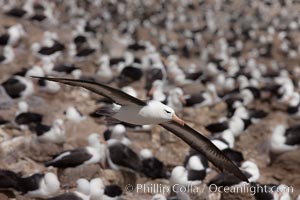
Black-browed albatross in flight, over the enormous colony at Steeple Jason Island in the Falklands.
Species: Black-browed albatross, Thalassarche melanophrys
Location: Steeple Jason Island, Falkland Islands, United Kingdom
Image ID: 24143
Species: Black-browed albatross, Thalassarche melanophrys
Location: Steeple Jason Island, Falkland Islands, United Kingdom
Image ID: 24143
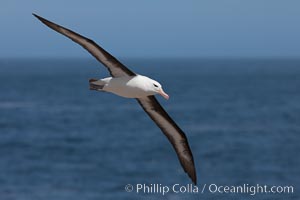
Black-browed albatross in flight, against a blue sky. Black-browed albatrosses have a wingspan reaching up to 8', weigh up to 10 lbs and can live 70 years. They roam the open ocean for food and return to remote islands for mating and rearing their chicks.
Species: Black-browed albatross, Thalassarche melanophrys
Location: Steeple Jason Island, Falkland Islands, United Kingdom
Image ID: 24145
Species: Black-browed albatross, Thalassarche melanophrys
Location: Steeple Jason Island, Falkland Islands, United Kingdom
Image ID: 24145
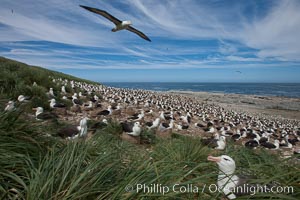
Black-browed albatross in flight, over the enormous colony at Steeple Jason Island in the Falklands.
Species: Black-browed albatross, Thalassarche melanophrys
Location: Steeple Jason Island, Falkland Islands, United Kingdom
Image ID: 24147
Species: Black-browed albatross, Thalassarche melanophrys
Location: Steeple Jason Island, Falkland Islands, United Kingdom
Image ID: 24147
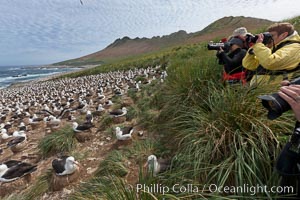
Visitors enjoy the spectacle, of the enormous breeding colony of black-browed albatrosses at Steeple Jason Island.
Species: Black-browed albatross, Thalassarche melanophrys
Location: Steeple Jason Island, Falkland Islands, United Kingdom
Image ID: 24148
Species: Black-browed albatross, Thalassarche melanophrys
Location: Steeple Jason Island, Falkland Islands, United Kingdom
Image ID: 24148
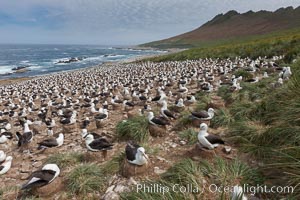
Black-browed albatross colony on Steeple Jason Island in the Falklands. This is the largest breeding colony of black-browed albatrosses in the world, numbering in the hundreds of thousands of breeding pairs. The albatrosses lay eggs in September and October, and tend a single chick that will fledge in about 120 days.
Species: Black-browed albatross, Thalassarche melanophrys
Location: Steeple Jason Island, Falkland Islands, United Kingdom
Image ID: 24149
Species: Black-browed albatross, Thalassarche melanophrys
Location: Steeple Jason Island, Falkland Islands, United Kingdom
Image ID: 24149
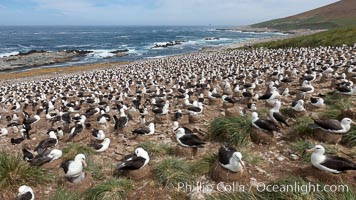
Black-browed albatross colony on Steeple Jason Island in the Falklands. This is the largest breeding colony of black-browed albatrosses in the world, numbering in the hundreds of thousands of breeding pairs. The albatrosses lay eggs in September and October, and tend a single chick that will fledge in about 120 days.
Species: Black-browed albatross, Thalassarche melanophrys
Location: Steeple Jason Island, Falkland Islands, United Kingdom
Image ID: 24150
Species: Black-browed albatross, Thalassarche melanophrys
Location: Steeple Jason Island, Falkland Islands, United Kingdom
Image ID: 24150
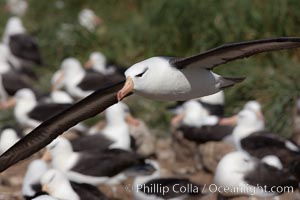
Black-browed albatross in flight, over the enormous colony at Steeple Jason Island in the Falklands.
Species: Black-browed albatross, Thalassarche melanophrys
Location: Steeple Jason Island, Falkland Islands, United Kingdom
Image ID: 24153
Species: Black-browed albatross, Thalassarche melanophrys
Location: Steeple Jason Island, Falkland Islands, United Kingdom
Image ID: 24153
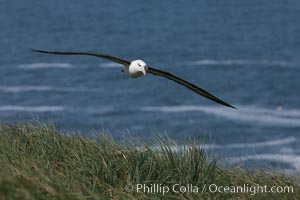
Black-browed albatross soaring in the air, near the breeding colony at Steeple Jason Island.
Species: Black-browed albatross, Thalassarche melanophrys
Location: Steeple Jason Island, Falkland Islands, United Kingdom
Image ID: 24154
Species: Black-browed albatross, Thalassarche melanophrys
Location: Steeple Jason Island, Falkland Islands, United Kingdom
Image ID: 24154
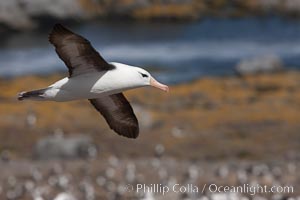
Black-browed albatross in flight, over the enormous colony at Steeple Jason Island in the Falklands.
Species: Black-browed albatross, Thalassarche melanophrys
Location: Steeple Jason Island, Falkland Islands, United Kingdom
Image ID: 24155
Species: Black-browed albatross, Thalassarche melanophrys
Location: Steeple Jason Island, Falkland Islands, United Kingdom
Image ID: 24155
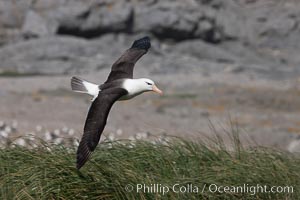
Black-browed albatross, Steeple Jason Island.
Species: Black-browed albatross, Thalassarche melanophrys
Location: Steeple Jason Island, Falkland Islands, United Kingdom
Image ID: 24156
Species: Black-browed albatross, Thalassarche melanophrys
Location: Steeple Jason Island, Falkland Islands, United Kingdom
Image ID: 24156
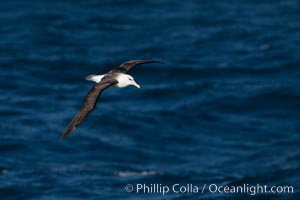
Black-browed albatross in flight, at sea. The black-browed albatross is a medium-sized seabird at 31-37" long with a 79-94" wingspan and an average weight of 6.4-10 lb. They have a natural lifespan exceeding 70 years. They breed on remote oceanic islands and are circumpolar, ranging throughout the Southern Ocean.
Species: Black-browed albatross, Thalassarche melanophrys
Location: Southern Ocean
Image ID: 24164
Species: Black-browed albatross, Thalassarche melanophrys
Location: Southern Ocean
Image ID: 24164
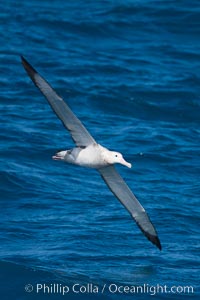
Wandering albatross in flight, over the open sea. The wandering albatross has the largest wingspan of any living bird, with the wingspan between, up to 12' from wingtip to wingtip. It can soar on the open ocean for hours at a time, riding the updrafts from individual swells, with a glide ratio of 22 units of distance for every unit of drop. The wandering albatross can live up to 23 years. They hunt at night on the open ocean for cephalopods, small fish, and crustaceans. The survival of the species is at risk due to mortality from long-line fishing gear.
Species: Wandering albatross, Diomedea exulans
Location: Southern Ocean
Image ID: 24169
Species: Wandering albatross, Diomedea exulans
Location: Southern Ocean
Image ID: 24169
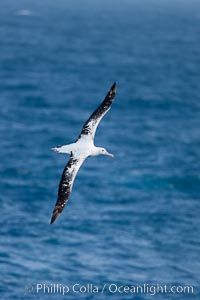
Wandering albatross in flight, over the open sea. The wandering albatross has the largest wingspan of any living bird, with the wingspan between, up to 12' from wingtip to wingtip. It can soar on the open ocean for hours at a time, riding the updrafts from individual swells, with a glide ratio of 22 units of distance for every unit of drop. The wandering albatross can live up to 23 years. They hunt at night on the open ocean for cephalopods, small fish, and crustaceans. The survival of the species is at risk due to mortality from long-line fishing gear.
Species: Wandering albatross, Diomedea exulans
Location: Southern Ocean
Image ID: 24170
Species: Wandering albatross, Diomedea exulans
Location: Southern Ocean
Image ID: 24170
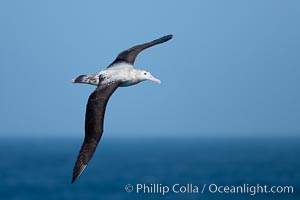
Wandering albatross in flight, over the open sea. The wandering albatross has the largest wingspan of any living bird, with the wingspan between, up to 12' from wingtip to wingtip. It can soar on the open ocean for hours at a time, riding the updrafts from individual swells, with a glide ratio of 22 units of distance for every unit of drop. The wandering albatross can live up to 23 years. They hunt at night on the open ocean for cephalopods, small fish, and crustaceans. The survival of the species is at risk due to mortality from long-line fishing gear.
Species: Wandering albatross, Diomedea exulans
Location: Southern Ocean
Image ID: 24171
Species: Wandering albatross, Diomedea exulans
Location: Southern Ocean
Image ID: 24171
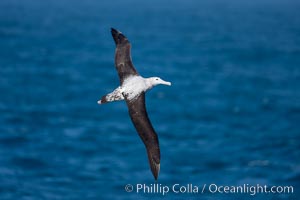
Wandering albatross in flight, over the open sea. The wandering albatross has the largest wingspan of any living bird, with the wingspan between, up to 12' from wingtip to wingtip. It can soar on the open ocean for hours at a time, riding the updrafts from individual swells, with a glide ratio of 22 units of distance for every unit of drop. The wandering albatross can live up to 23 years. They hunt at night on the open ocean for cephalopods, small fish, and crustaceans. The survival of the species is at risk due to mortality from long-line fishing gear.
Species: Wandering albatross, Diomedea exulans
Location: Southern Ocean
Image ID: 24172
Species: Wandering albatross, Diomedea exulans
Location: Southern Ocean
Image ID: 24172
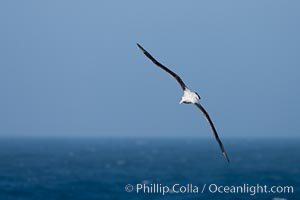
Wandering albatross in flight, over the open sea. The wandering albatross has the largest wingspan of any living bird, with the wingspan between, up to 12' from wingtip to wingtip. It can soar on the open ocean for hours at a time, riding the updrafts from individual swells, with a glide ratio of 22 units of distance for every unit of drop. The wandering albatross can live up to 23 years. They hunt at night on the open ocean for cephalopods, small fish, and crustaceans. The survival of the species is at risk due to mortality from long-line fishing gear.
Species: Wandering albatross, Diomedea exulans
Location: Southern Ocean
Image ID: 24173
Species: Wandering albatross, Diomedea exulans
Location: Southern Ocean
Image ID: 24173
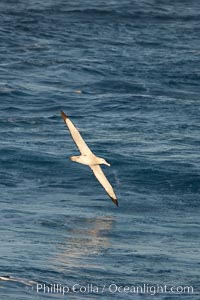
Wandering albatross in flight, over the open sea. The wandering albatross has the largest wingspan of any living bird, with the wingspan between, up to 12' from wingtip to wingtip. It can soar on the open ocean for hours at a time, riding the updrafts from individual swells, with a glide ratio of 22 units of distance for every unit of drop. The wandering albatross can live up to 23 years. They hunt at night on the open ocean for cephalopods, small fish, and crustaceans. The survival of the species is at risk due to mortality from long-line fishing gear.
Species: Wandering albatross, Diomedea exulans
Location: Southern Ocean
Image ID: 24174
Species: Wandering albatross, Diomedea exulans
Location: Southern Ocean
Image ID: 24174
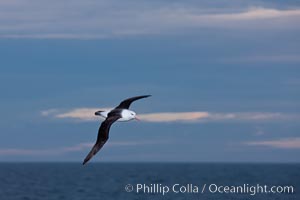
Black-browed albatross, in flight over the ocean. The wingspan of the black-browed albatross can reach 10', it can weigh up to 10 lbs and live for as many as 70 years.
Species: Black-browed albatross, Thalassarche melanophrys
Location: Southern Ocean
Image ID: 24186
Species: Black-browed albatross, Thalassarche melanophrys
Location: Southern Ocean
Image ID: 24186
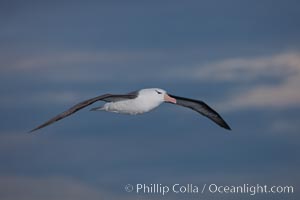
Black-browed albatross in flight, against a blue sky. Black-browed albatrosses have a wingspan reaching up to 8', weigh up to 10 lbs and can live 70 years. They roam the open ocean for food and return to remote islands for mating and rearing their chicks.
Species: Black-browed albatross, Thalassarche melanophrys
Location: Southern Ocean
Image ID: 24187
Species: Black-browed albatross, Thalassarche melanophrys
Location: Southern Ocean
Image ID: 24187
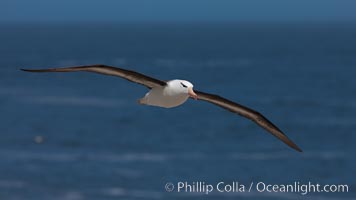
Black-browed albatross, in flight over the ocean. The wingspan of the black-browed albatross can reach 10', it can weigh up to 10 lbs and live for as many as 70 years.
Species: Black-browed albatross, Thalassarche melanophrys
Location: Steeple Jason Island, Falkland Islands, United Kingdom
Image ID: 24210
Species: Black-browed albatross, Thalassarche melanophrys
Location: Steeple Jason Island, Falkland Islands, United Kingdom
Image ID: 24210
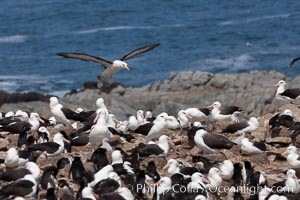
Black-browed albatross in flight, over the enormous colony at Steeple Jason Island in the Falklands.
Species: Black-browed albatross, Thalassarche melanophrys
Location: Steeple Jason Island, Falkland Islands, United Kingdom
Image ID: 24211
Species: Black-browed albatross, Thalassarche melanophrys
Location: Steeple Jason Island, Falkland Islands, United Kingdom
Image ID: 24211
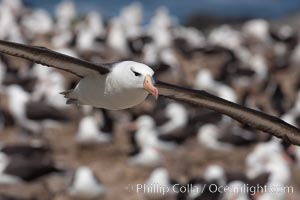
Black-browed albatross in flight, over the enormous colony at Steeple Jason Island in the Falklands.
Species: Black-browed albatross, Thalassarche melanophrys
Location: Steeple Jason Island, Falkland Islands, United Kingdom
Image ID: 24212
Species: Black-browed albatross, Thalassarche melanophrys
Location: Steeple Jason Island, Falkland Islands, United Kingdom
Image ID: 24212
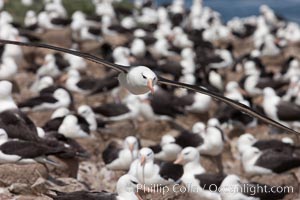
Black-browed albatross in flight, over the enormous colony at Steeple Jason Island in the Falklands.
Species: Black-browed albatross, Thalassarche melanophrys
Location: Steeple Jason Island, Falkland Islands, United Kingdom
Image ID: 24213
Species: Black-browed albatross, Thalassarche melanophrys
Location: Steeple Jason Island, Falkland Islands, United Kingdom
Image ID: 24213
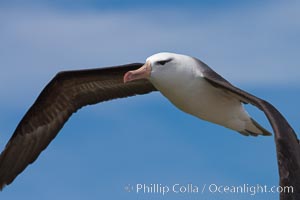
Black-browed albatross, in flight over the ocean. The wingspan of the black-browed albatross can reach 10', it can weigh up to 10 lbs and live for as many as 70 years.
Species: Black-browed albatross, Thalassarche melanophrys
Location: Steeple Jason Island, Falkland Islands, United Kingdom
Image ID: 24214
Species: Black-browed albatross, Thalassarche melanophrys
Location: Steeple Jason Island, Falkland Islands, United Kingdom
Image ID: 24214
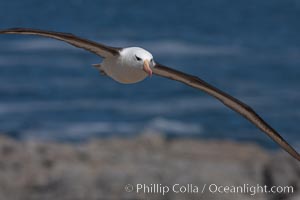
Black-browed albatross soaring in the air, near the breeding colony at Steeple Jason Island.
Species: Black-browed albatross, Thalassarche melanophrys
Location: Steeple Jason Island, Falkland Islands, United Kingdom
Image ID: 24215
Species: Black-browed albatross, Thalassarche melanophrys
Location: Steeple Jason Island, Falkland Islands, United Kingdom
Image ID: 24215
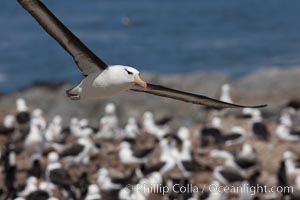
Black-browed albatross in flight, over the enormous colony at Steeple Jason Island in the Falklands.
Species: Black-browed albatross, Thalassarche melanophrys
Location: Steeple Jason Island, Falkland Islands, United Kingdom
Image ID: 24216
Species: Black-browed albatross, Thalassarche melanophrys
Location: Steeple Jason Island, Falkland Islands, United Kingdom
Image ID: 24216
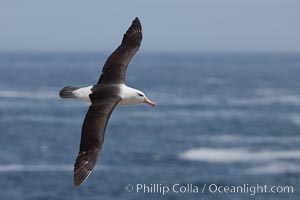
Black-browed albatross, in flight over the ocean. The wingspan of the black-browed albatross can reach 10', it can weigh up to 10 lbs and live for as many as 70 years.
Species: Black-browed albatross, Thalassarche melanophrys
Location: Steeple Jason Island, Falkland Islands, United Kingdom
Image ID: 24217
Species: Black-browed albatross, Thalassarche melanophrys
Location: Steeple Jason Island, Falkland Islands, United Kingdom
Image ID: 24217
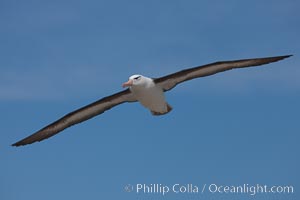
Black-browed albatross in flight, against a blue sky. Black-browed albatrosses have a wingspan reaching up to 8', weigh up to 10 lbs and can live 70 years. They roam the open ocean for food and return to remote islands for mating and rearing their chicks.
Species: Black-browed albatross, Thalassarche melanophrys
Location: Steeple Jason Island, Falkland Islands, United Kingdom
Image ID: 24218
Species: Black-browed albatross, Thalassarche melanophrys
Location: Steeple Jason Island, Falkland Islands, United Kingdom
Image ID: 24218
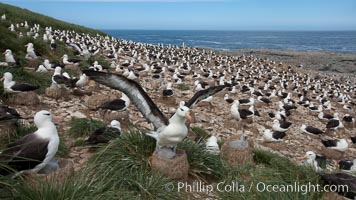
Black-browed albatross, Steeple Jason Island.
Species: Black-browed albatross, Thalassarche melanophrys
Location: Steeple Jason Island, Falkland Islands, United Kingdom
Image ID: 24220
Species: Black-browed albatross, Thalassarche melanophrys
Location: Steeple Jason Island, Falkland Islands, United Kingdom
Image ID: 24220
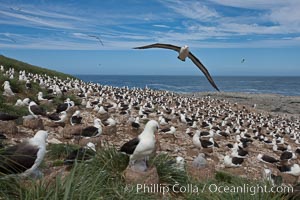
Black-browed albatross in flight, over the enormous colony at Steeple Jason Island in the Falklands.
Species: Black-browed albatross, Thalassarche melanophrys
Location: Steeple Jason Island, Falkland Islands, United Kingdom
Image ID: 24221
Species: Black-browed albatross, Thalassarche melanophrys
Location: Steeple Jason Island, Falkland Islands, United Kingdom
Image ID: 24221